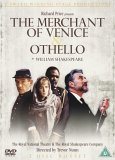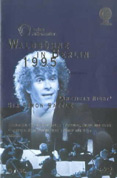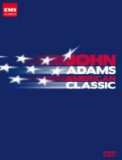 Othello | DVD | (17/11/2003)
from £12.99
| Saving you £7.00 (53.89%)
| RRP
Othello | DVD | (17/11/2003)
from £12.99
| Saving you £7.00 (53.89%)
| RRP Critically acclaimed adaptation starring Sir Ian McKellen. Unparalleled in its simplicity and in the timelessness of its ferocious and pointed deeply human tragedy Shakespeare's 'Othello' is presented here in yet another award winning brilliantly rendered production from legendary director Trevor Nunn and the Royal Shakespeare Company.
![Adams: El Nino [2000]](/pictures/1028620.jpg) Adams: El Nino | DVD | (15/10/2001)
from £4.49
| Saving you £21.76 (673.68%)
| RRP
Adams: El Nino | DVD | (15/10/2001)
from £4.49
| Saving you £21.76 (673.68%)
| RRP John Adams set out to write an oratorio about the Nativity of Christ; but as he worked on it, El Nino became a more dramatic piece than he intended, flowering into a staged opera in which the oratorio's free-flowing singer's identity becomes an effective statement of a mystical point. Dawn Upshaw and Lorraine Hunt Lieberson--singing a mixture of biblical texts and Spanish/Mexican poetry--are both Mary and at the same time all women. The same is true of the dancer Daniela Graca, the women of the chorus and the young Hispanic-American woman who has her child and argues with her boyfriend in contemporary LA. Willard White is both Joseph and Herod, while the trio of counter-tenors are Angels and Shepherds and Kings. Because the work was written in close consultation with director Peter Sellars, it is a remarkably collaborative vision of music and staging. This is a gloriously sung piece, which continues Adams' voyage through minimalism into a lush tonal style still informed by minimalist simplicity, but it is also an impressive piece of theatre in which every physical gesture has a musical cue. This production from the Chatelet Theatre, Paris, under the baton of Kent Nagano, is more or less definitive. On the DVD: Unusually for an Arthaus Musik release, this DVD comes with an extended documentary in which Adams, Sellars, Nagano and Upshaw talk insightfully about the creation and nature of the piece. Sellars is particularly impressive in his talk of opera as the art form for a multicultural era. The picture format is 16:9 and the viewer is offered a choice of PCM stereo or Dolby Digital for the audio.--Roz Kaveney
![Gershwin: Porgy And Bess [1992]](/pictures/1028700.jpg) Gershwin: Porgy And Bess | DVD | (14/05/2001)
from £N/A
| Saving you £N/A (N/A%)
| RRP
Gershwin: Porgy And Bess | DVD | (14/05/2001)
from £N/A
| Saving you £N/A (N/A%)
| RRP This production is directed by Trevor Nunn and is based on his highly successful Glyndebourne staging in 1986/87 which was revived at Covent Garden in the autumn of 1992 with most of the original cast including Willard White and Cynthia Haymon. Immediately after that performance the production was moved to the giant stage at Shepperton Studios with much expanded sets and lighting. It was then recorded using the original award-winning EMI soundtrack. The romance and beauty of this tender story its dramatic development and the sheer vitality of the characters come alive in this exciting visual production.
![Mozart: The Mozart Glyndebourne Collection [1973]](/pictures/1046551.jpg) Mozart: The Mozart Glyndebourne Collection | DVD | (28/11/2005)
from £51.39
| Saving you £8.60 (16.73%)
| RRP
Mozart: The Mozart Glyndebourne Collection | DVD | (28/11/2005)
from £51.39
| Saving you £8.60 (16.73%)
| RRP Six Mozart features: 'Cosi Fan Tutte (1975)' 'Don Giovani (1977)' 'Die Entfuhrung Aus Dem Serail (1980)' 'Idomeneo (1974)' 'Le Nozze Di Figaro (1973)' and 'Die Zauberflote (1978)'.
 Sergei Prokofiev: The Love For Three Oranges | DVD | (31/07/2006)
from £34.55
| Saving you £-4.56 (N/A%)
| RRP
Sergei Prokofiev: The Love For Three Oranges | DVD | (31/07/2006)
from £34.55
| Saving you £-4.56 (N/A%)
| RRP Sergey Prokofiev - The Love For Three Oranges.Opera in four acts and a prologue.
![Die Entfuhrung Aus Dem Serail - Mozart [1980]](/pictures/1046561.jpg) Die Entfuhrung Aus Dem Serail - Mozart | DVD | (01/08/2005)
from £17.99
| Saving you £-3.00 (N/A%)
| RRP
Die Entfuhrung Aus Dem Serail - Mozart | DVD | (01/08/2005)
from £17.99
| Saving you £-3.00 (N/A%)
| RRP Recorded at the Glyndebourne Festival Opera 1980
![The Love Of Three Oranges [DVD] [1982]](/pictures/1094841.jpg) The Love Of Three Oranges | DVD | (05/11/2011)
from £N/A
| Saving you £N/A (N/A%)
| RRP
The Love Of Three Oranges | DVD | (05/11/2011)
from £N/A
| Saving you £N/A (N/A%)
| RRP This Glyndebourne production of Prokofiev's comic fairy tale opera The Love of Three Oranges recorded in 1982 is nothing short of a sizzling visual extravaganza. The combination of Frank Corsaro's innovative direction and the brilliant creative designs of American book writer and illustrator Maurice Sendak have created an opera which mixes fantasy nightmare romance and satire. The whole production is alive with acrobats jugglers body-builders monsters outrageous inflatable figures colossal puppets and special animated sequences - creating a farcical carnival atmosphere. Willard White powerfully portrays the King whose son a doleful hypochondriac can only be cured through laughter. The antics of the court jester Truffaldino fail to raise even a giggle and it is only when the wicked witch Fata Morgana (Nelly Morpurgo) accidently loses her skirt that the Prince (Ryland Davies) breaks into hysterics. In revenge Morgana condemns the Prince to fall in love with three oranges which he pursues for three thousand miles. The exciting rhythms and brilliant orchestration of Prokofiev's score are conducted by Bernard Haitink. The cast also includes Nucci Condo (Clarissa) John Pringle (Leandro) Ugo Benelli (Truffaldino) Peter-Christoph Runge (Pantaloon) Richard Van Allan (Tchelio) Yvonne Lea (Princess Linetta) Susan Moore (Princess Nicoletta) Fiona Kimm (Smeraldina) Colette Alliot-Lugaz (Princess Ninetta) Roger Bryson (Herald/Cook) Hugh Hetherington (Master of Ceremonies) and Derek Hammond-Stroud (Farfarello).
![Die Zauberflote [1978]](/pictures/1028159.jpg) Die Zauberflote | DVD | (14/06/2004)
from £20.23
| Saving you £-5.24 (N/A%)
| RRP
Die Zauberflote | DVD | (14/06/2004)
from £20.23
| Saving you £-5.24 (N/A%)
| RRP Opera in two acts from the Glyndebourne Festival Opera 1978. Sung in German.
![Hans Werner Henzes The Bassarids(Blu Ray) [Blu-ray] [2018] [Region A & B & C]](/pictures/1152120.jpg) Hans Werner Henzes The Bassarids(Blu Ray) | Blu Ray | (11/10/2019)
from £45.25
| Saving you £N/A (N/A%)
| RRP
Hans Werner Henzes The Bassarids(Blu Ray) | Blu Ray | (11/10/2019)
from £45.25
| Saving you £N/A (N/A%)
| RRP  Verdi: Falstaff -- Aix-en-Provence/Mazzola | DVD | (20/09/2002)
from £N/A
| Saving you £N/A (N/A%)
| RRP
Verdi: Falstaff -- Aix-en-Provence/Mazzola | DVD | (20/09/2002)
from £N/A
| Saving you £N/A (N/A%)
| RRP With Willard White in the title role, this very well-sung production of Falstaff from the Aix-en-Provence festival, set in the 1950s, makes for a radical yet plausibly alternative view to the traditional setting in "Merrie England". By casting Jamaican-born baritone White in the title role, director Herbert Wernicke has emphasised Falstaff's role as an outsider, spurned by the community on account of his success as a local businessman and here with the added burden of being black. White engages our sympathy for Falstaff's plight, notably in the last act where he finally turns the table on his adversary, Ford. Yet in his world-weary sophisticated persona this Falstaff seems at odds with the farce unfolding about him; he's been there, done that. There are, nevertheless, key moments to relish: his flicker of the eye as he dismisses Pistol and Bardolph with his letters to the Misses Ford and Page; the duet he shares with Ford on the trials and tribulations of love; and the return of his self-esteem as he pulls himself up to full height following his ducking in the Thames. His face in the final act, shot in close-up, white beard illuminated by moonlight, framed by Herne's horns, is unforgettable. The supporting cast are uniformly excellent as singers and actors, a joy to watch and hear. The main set consists of a polished wooden floor with walls of wooden slatted flaps that open and shut as characters drop in and out of the action. White linen on washing lines, sheets tumbling out of drawers, or, somewhat incongruously, neatly folded on the bed that Falstaff rolls out of after his dip in the Thames, make welcome visual diversions. The Orchestre de Paris play brilliantly under maestro Enrique Mazzola who captures the ebb and flow of Verdi's fast moving score to perfection. On the DVD: Falstaff on disc has subtitles in Italian, English, German, French and Spanish. The picture quality has a real three-dimensional feel to it and the soundtrack likewise. --Adrian Edwards
 Othello / Merchant Of Venice | DVD | (30/01/2006)
from £N/A
| Saving you £N/A (N/A%)
| RRP
Othello / Merchant Of Venice | DVD | (30/01/2006)
from £N/A
| Saving you £N/A (N/A%)
| RRP Othello: Trevor Nunn's masterful interpretation of William Shakespeare's Othello stars Ian McKellan as the conniving treacherous Iago. Othello (acclaimed operatic bass Willard White) is a Moroccan nobleman whose marriage to the lovely and loyal Desdemona is untroubled by jealousy or conflict. That is until his trusted confidante Iago who is envious of Othello's happiness begins to scheme against the couple and ultimately incites a jealous rage in the honorable aristocrat. O
![Prokofiev - the Love for Three Oranges (Deneve, Pelly) [Blu-ray]](/pictures/1089633.jpg) Prokofiev - the Love for Three Oranges (Deneve, Pelly) | Blu Ray | (27/10/2008)
from £27.47
| Saving you £2.52 (9.17%)
| RRP
Prokofiev - the Love for Three Oranges (Deneve, Pelly) | Blu Ray | (27/10/2008)
from £27.47
| Saving you £2.52 (9.17%)
| RRP The Rotterdam Philharmonic Orchestra perform Prokofiev's The Love For Three Oranges at the Amsterdam Muziektheater in 2005.
![WAGNER: Die Walkure - Sir Simon Rattle / Berlin Philharmonic Orchestra (Willard White / Eva-Maria Westbroek / Eva Johansson / Robert Gambill) [Blu-ray] [2008]](/pictures/1089517.jpg) WAGNER: Die Walkure - Sir Simon Rattle / Berlin Philharmonic Orchestra (Willard White / Eva-Maria Westbroek / Eva Johansson / Robert Gambill) | Blu Ray | (27/10/2008)
from £26.98
| Saving you £3.01 (10.00%)
| RRP
WAGNER: Die Walkure - Sir Simon Rattle / Berlin Philharmonic Orchestra (Willard White / Eva-Maria Westbroek / Eva Johansson / Robert Gambill) | Blu Ray | (27/10/2008)
from £26.98
| Saving you £3.01 (10.00%)
| RRP ![Iolanta/ Persephone (Ekaterina Scherbachenko/ Alexej Markov/ Children's Chorus/ Chorus and Orchestra of the Teatro Real/ / Teodor Currentzis/ Peter Sellars) (Teatro Real: TR97010BD) [Blu-ray]](/pictures/1118773.jpg) Iolanta/ Persephone (Ekaterina Scherbachenko/ Alexej Markov/ Children's Chorus/ Chorus and Orchestra of the Teatro Real/ / Teodor Currentzis/ Peter Sellars) (Teatro Real: TR97010BD) | Blu Ray | (15/10/2012)
from £23.79
| Saving you £6.20 (26.06%)
| RRP
Iolanta/ Persephone (Ekaterina Scherbachenko/ Alexej Markov/ Children's Chorus/ Chorus and Orchestra of the Teatro Real/ / Teodor Currentzis/ Peter Sellars) (Teatro Real: TR97010BD) | Blu Ray | (15/10/2012)
from £23.79
| Saving you £6.20 (26.06%)
| RRP  Waldbuhne 1995 - American Night | DVD | (10/04/2000)
from £N/A
| Saving you £N/A (N/A%)
| RRP
Waldbuhne 1995 - American Night | DVD | (10/04/2000)
from £N/A
| Saving you £N/A (N/A%)
| RRP A compilation of music conducted by Simon Rattle. Includes the works:- `Rhapsody In Blue` and `Summertime` - George Gershwin `Candide` - Leonard Bernstein and `Berliner Luft` - Paul Lincke.
![Adams - El Nino (Chatelet) [2000]](/pictures/1077525.jpg) Adams - El Nino (Chatelet) | DVD | (15/10/2001)
from £N/A
| Saving you £N/A (N/A%)
| RRP
Adams - El Nino (Chatelet) | DVD | (15/10/2001)
from £N/A
| Saving you £N/A (N/A%)
| RRP Adams - El Nino (Chatelet)
 John Adams - American Classic | DVD | (24/11/2008)
from £N/A
| Saving you £N/A (N/A%)
| RRP
John Adams - American Classic | DVD | (24/11/2008)
from £N/A
| Saving you £N/A (N/A%)
| RRP John Adams is America''s most frequently performed living composer. He has managed the considerable feat of writing accessible music that still surprises and challenges its listeners. In the words of the New Yorker he is ''the man who takes the agony out of modern music''. Though he is not the only composer who has combined a classical education with a pop sensibility he is the one who has made the synthesis stick. Richly harmonic his music embraces just about every style from Minimalism to Mahler rock to jazz hymns to Liberace but always winds up sounding like Adams. Adams is also one of music''s most controversial figures - thanks to opera. Nixon in China started a whole new genre in modern opera. The Death of Klinghoffer dealt with the 1985 hijacking of a cruise liner by four Palestinian terrorists. Now made into a feature film it is one of the most contentious operatic works written in over a century. Ironically Adams started out hating opera but his own musical development made him the perfect composer for it. This profile of the man who led contemporary music out of the cul-de-sac of the avant-garde and revitalised modem opera centres on a major interview filmed at his home outside San Francisco. There are contributions from stage director Peter Sellars librettist Alice Goodman and conductor Michael Tilson Thomas and extensive performance extracts from Nixon in China and El Nino. His orchestral compositions Shaker Loops The Chamber Symphony and Gnarly Buttons are also featured.

Please wait. Loading...
This site uses cookies.
More details in our privacy policy